Chief of police
A chief of police (COP) is the title given to an appointed official or an elected one in the chain of command of a police department, particularly in North America. A chief of police may also be known as a police chief or sometimes just a chief, while some countries favour other titles such as commissioner or chief constable. A police chief is appointed by and answerable to a state or local government.
Duties
The precise role of a chief of police varies by country and sometimes within a country. The larger a police force or department, the more likely that some duties will be delegated to mid-ranked officers. The following list is a general sense of the actions and responsibilities held by any chief of police.
- Oversight of a department's operations and budgeting
- Oversight of officers
- Limited disciplinary actions to be addressed on infractions of policy, rules, regulations, laws or ordinances[1]
- Full dismissal or heavy sanctioning of officer duty; these powers vary by department
- Promotion and rank placement of officers
- Production and development of department policies and regulations
- Liaison with the governments that oversee and fund the department
- In small police departments, upkeep and updating of department equipment such as police vehicles, weapons, communications equipment and uniforms[2]
- In the smallest police departments, the chief may also carry out the same duties as regular officers (patrol, investigations, etc.)
Police chiefs are usually sworn police officers, and therefore wear police uniforms and have the power of arrest, though there are exceptions. In practice, their work is administrative in all but the smallest police departments. The rare occasions when police chiefs make arrests have drawn media coverage. In 2014, Bernard Hogan-Howe chased a group of fare evaders and made an arrest. A taxi driver had approached Hogan-Howe for help, unaware that he was London's police commissioner.[3][4] In 2017, Los Angeles Police Department Chief Charlie Beck arrested a police officer on suspicion of a sexual offence.[5]
Canada
"Chief of police" (French: directeur) is the most common title for the highest-ranked officer in a Canadian police service. The exceptions are: the Royal Canadian Mounted Police (commissioner), Ontario Provincial Police (commissioner), South Coast British Columbia Transportation Authority Police Service (chief officer), Vancouver Police Department (chief constable), West Vancouver Police Department (chief constable), Nelson Police Department (chief constable), Quebec City (director) and the Sûreté du Québec (director general).
In the province of Ontario, a chief of police must be a sworn police officer and therefore have completed training at the Ontario Police College or have served a probationary period with another recognized police force (such as the Royal Canadian Mounted Police's academy known as "Depot"). This requirement is legislated in the Police Services Act of Ontario. The legislation states in section two that a chief of police is a police officer. Section 44.2 of the PSA defines the training requirements. There was a case in the police department of Guelph, Ontario, where a human resource manager was promoted to the position of deputy chief but was required to complete training at the OPC. The candidate is selected by a police services board.
Deputy chief
Ranks below the chief are stylized as deputy chief, deputy chief constable (BC) and deputy commissioner or associate director (Quebec).
India
In India, the agency executive of Kerala State Police is known as the State Police Chief.
In India, the head of a police department is an officer with the rank of Director General of Police (DGP).Most Indian state police departments usually only have one officer with rank of DGP, who serves as the agency executive of the states police department, however the state of kerala generally has more than officer with the rank of DGP, because of which one of the Directors General is appointed to the position of the State Police Chief (SPC).
Indonesia
In Indonesia, the chief of the National Police of Indonesia is often colloquially dubbed: "Kapolri", an acronym of "Kepala Kepolisian Negara Republik Indonesia" meaning "Head of the National Police of the Republic of Indonesia".The National Police Chiefs are four-star ranking officers in the national police. The National Police Chief is appointed to the position by the President of Indonesia after the nomination of a candidate is approved in House of Representatives and is directly responsible to the president. Since Indonesia adopts the system of a unified "national police", the chief of the Indonesian National Police holds strong responsibility in policing authorities nationally across Indonesia. The police chief usually conducts strong relations and work together with the Commander of the National Armed Forces. In line with the general features of unified structure of local governments, all chiefs of the Indonesian police, at district level ("kapolsek", kepala kepolisian sektor"), municipal level ("kapolres", kepala kepolisian resor"), and provincial level ("kapolda", kepala kepolisian daerah) in Indonesia, are subordinates of Kapolri, the national police chief.
Philippines
In the Philippines, the chief of police was the head of small city and municipal police.
United Kingdom
In the United Kingdom, the chief police officer for 43 of the 45 territorial police forces and the three special police forces holds the rank of chief constable. The exceptions are the Metropolitan Police Service and City of London Police, where the chief police officer instead holds the rank of commissioner. The umbrella term for the chief constables and commissioners is "chief police officer". The term "chief officer", by contrast, includes the chief police officers and their deputies and assistants. The National Police Chiefs Council is the association for chief officers.
The rank of commissioner should not be confused with the police and crime commissioners. They are elected officials who oversee a police force and how its funds are spent, rather than being police officers.
United States
Chief of police is the most common title for the head of a police department of a city. The highest-ranking officers of boroughs and parishes are also known as police chiefs. In large urban areas, some departments are led by an overseer who is not a sworn officer, usually referred to as a commissioner. In these departments, the police chief is the highest-ranking police officer of the agency but not the department head. The New York City Police Department is one such case where the commissioner is the head of the NYPD. The resources available to the head of a police department vary greatly; the chief of a small town may be the only paid employee of the police department with volunteer officers at his disposal only on certain occasions. On the other hand, the chief of a major city may have thousands or in the case of very large cities such as New York tens of thousands of sworn officers. Such a department may have thousands of employees other than police officers, including operators, secretaries, and unsworn peace officers. Alternative titles for a chief of police include police commissioner, colonel, police superintendent, police president or police director.
A sheriff is the chief of a county law enforcement agency. Although sheriffs are not usually counted as police chiefs, their agencies usually have the powers and role of a police department (although in some rare cases, the role of a sheriff's agency is limited to non-policing matters such as courtroom security). The usual difference between a sheriff and a police chief is that sheriffs are elected (except in New York City, Rhode Island and Hawaii) and responsible for a county[6] whereas a police chief manages law enforcement in a city or town and is appointed by its local government. Many state constitutions require every county to have a sheriff; some make no provision for this position to be eliminated even in the case of the formation of a consolidated city–county or "metropolitan government" because of which a decision on the division the powers between the county sheriff and the city chief of police is made. The usual compromise allows the chief of police to exercise law enforcement jurisdiction and to give the sheriff and his deputies authority over jails and the serving of civil papers. An alternative and lesser-used solution is to make the office of sheriff a purely ceremonial one. One other solution, an example of which is seen in the case of the Las Vegas Metropolitan Police Department, is to provide for the sheriff to simultaneously serve as the chief of police, thus remaining as the chief law enforcement officer (CLEO) of the county. Other titles for the executives of Sheriff's Departments include colonel, superintendent, and director.
The fraternal organization International Association of Chiefs of Police (IACP) is an organization that many chiefs of police are associated with.
The extent to how much a police a police department is overtly influenced by politics is also an important topic and varies greatly from one jurisdiction to another. Increasingly, all U.S. law enforcement officers including small-town police chiefs and their charges are being required to meet at least minimum levels of professional training.
The rank insignia for the chief of a large or medium-sized department most often consists of three or four gold stars, similar to the insignia of a lieutenant general or general in the army. Smaller departments and state agencies most often consists of silver or gold eagles similar to colonel in the army.
Gallery
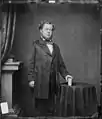 Pensacola, Florida, town marshal, Stephen Mallory 1832
Pensacola, Florida, town marshal, Stephen Mallory 1832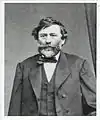 San Diego, California, sheriff and city marshal, Agoston Haraszthy 1850
San Diego, California, sheriff and city marshal, Agoston Haraszthy 1850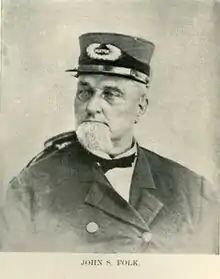 Brooklyn, NY, police chief John S. Folk 1851-1865
Brooklyn, NY, police chief John S. Folk 1851-1865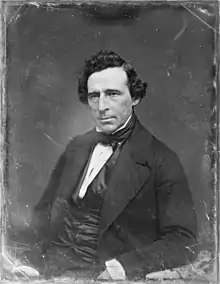 NYPD Police Chief John Alexander Kennedy 1860-1863
NYPD Police Chief John Alexander Kennedy 1860-1863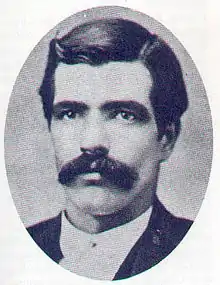 Abilene Kansas town marshal Thomas J Smith 1870
Abilene Kansas town marshal Thomas J Smith 1870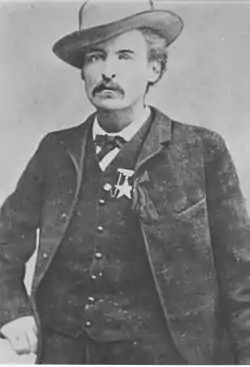 Ft Worth, Texas, city marshal, Jim Courtright 1876-1879
Ft Worth, Texas, city marshal, Jim Courtright 1876-1879![Atlanta, GA, police chief, George T. Anderson 1877-1881 [Later police chief Anniston, Alabama]](../I/GTAnderson.jpg.webp) Atlanta, GA, police chief, George T. Anderson 1877-1881 [Later police chief Anniston, Alabama]
Atlanta, GA, police chief, George T. Anderson 1877-1881 [Later police chief Anniston, Alabama]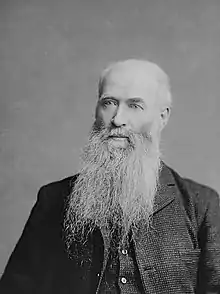 Washington DC Police Chief William McEntyre Dye 1878
Washington DC Police Chief William McEntyre Dye 1878 Deer Lodge Montana Town Marshal John Jeremiah Garrison Johnston
Deer Lodge Montana Town Marshal John Jeremiah Garrison Johnston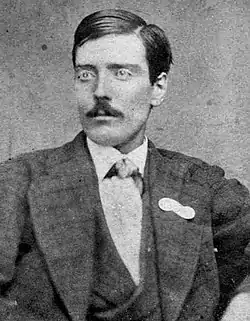 Dodge City, Kansas, town marshal, Ed Masterson 1878-1879
Dodge City, Kansas, town marshal, Ed Masterson 1878-1879 Trinadad, Colorado, town marshal, Bat Masterson 1880-1882
Trinadad, Colorado, town marshal, Bat Masterson 1880-1882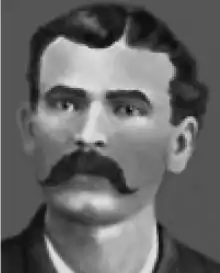 Tombstone, Arizona, town marshal, Fred White 1880
Tombstone, Arizona, town marshal, Fred White 1880 Tombstone, Arizona, town marshall, Virgil Earp 1881-1882
Tombstone, Arizona, town marshall, Virgil Earp 1881-1882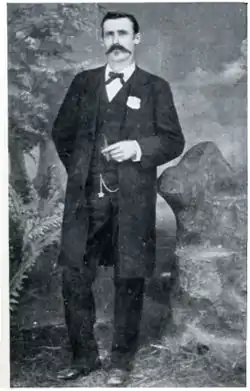 El Paso, Texas, city marshal, Dallas Stoudenmire 1881-1882
El Paso, Texas, city marshal, Dallas Stoudenmire 1881-1882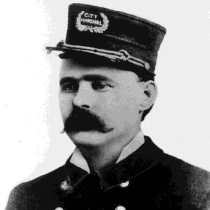 Austin City marshal, Ben Thompson a predecessor to the Austin Police Department 1881-1882
Austin City marshal, Ben Thompson a predecessor to the Austin Police Department 1881-1882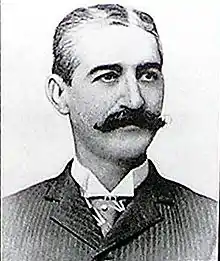 New Orleans superintendent/chief of police David Hennessy 1889-1890
New Orleans superintendent/chief of police David Hennessy 1889-1890 NYPD commissioner, Theodore Roosevelt 1894-1895
NYPD commissioner, Theodore Roosevelt 1894-1895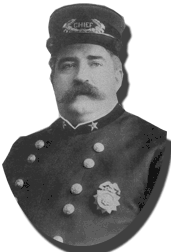 NYPD superintendent/chief of police, William S. Devery 1898-1902
NYPD superintendent/chief of police, William S. Devery 1898-1902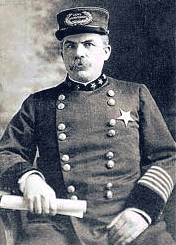 Chicago police chief, James O'Neill 1901-1905
Chicago police chief, James O'Neill 1901-1905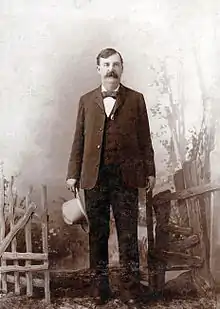 Lawton Oklahoma police chief Heck Thomas 1902
Lawton Oklahoma police chief Heck Thomas 1902.jpeg.webp) CW Wappenstein, chief of the police department, Alaska Yukon Pacific Exposition, Seattle, 1909
CW Wappenstein, chief of the police department, Alaska Yukon Pacific Exposition, Seattle, 1909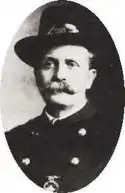 Oklahoma City police chief, Bill Tilghman 1911-1912
Oklahoma City police chief, Bill Tilghman 1911-1912.jpg.webp) Washington D.C. police chief, Pelham D. Glassford 1931-1932;
Washington D.C. police chief, Pelham D. Glassford 1931-1932;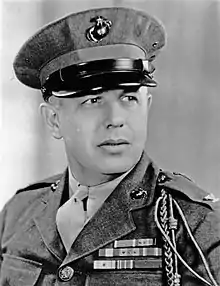 LAPD Police Chief William A Worton 1949-1950
LAPD Police Chief William A Worton 1949-1950 Dallas Texas Police Chief Jesse E Curry (1963)
Dallas Texas Police Chief Jesse E Curry (1963) Philadelphia police commissioner, Frank Rizzo 1972
Philadelphia police commissioner, Frank Rizzo 1972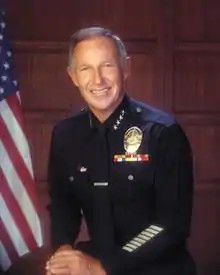 LAPD Police Chief Daryl Gates 1978-1992
LAPD Police Chief Daryl Gates 1978-1992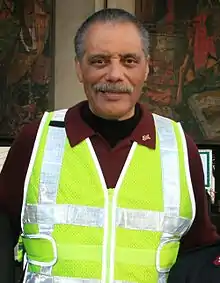 LAPD Police Chief Bernard C. Parks 1997-2003
LAPD Police Chief Bernard C. Parks 1997-2003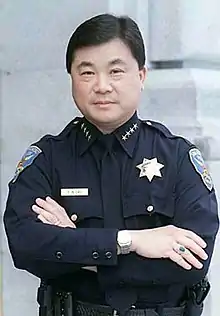 San Francisco police chief, Fred Lau, 1996-2002
San Francisco police chief, Fred Lau, 1996-2002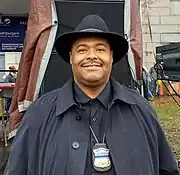 Boston Police Commissioner, William Gross, 2018-2021
Boston Police Commissioner, William Gross, 2018-2021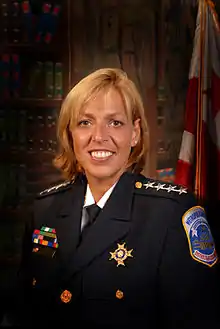 Washington D.C. police chief, Cathy Lanier 2007-2016
Washington D.C. police chief, Cathy Lanier 2007-2016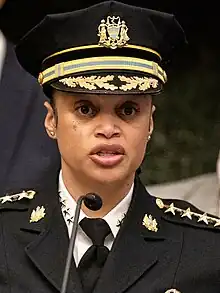 Philadephia Police Commissioner Danielle Outlaw 2020-
Philadephia Police Commissioner Danielle Outlaw 2020-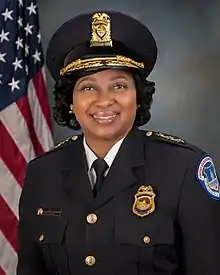 Yogananda D. Pittmanacting Police Chief of US Capital Police 2021-
Yogananda D. Pittmanacting Police Chief of US Capital Police 2021-
See also
References
- "Section 200.010: Chief of Police - Duties - Salary". Retrieved 2019-12-29.
- "Municipal Code". Archived from the original on 2011-05-05. Retrieved 2009-10-04.
- "Met Police Commissioner stops interview to make arrest". BBC News. 11 August 2014. Retrieved 1 December 2016.
- "London police chief interrupts interview to nab suspected thief". CTV News Channel. Bell Media. 12 August 2014. Retrieved 1 December 2016.
- "LAPD Chief Beck personally arrests officer on suspicion of having sex with a 15-year-old". The Los Angeles Times. 22 June 2017. Retrieved 29 June 2018.
- "About NSA". Archived from the original on 2010-01-10. Retrieved 2019-12-29.